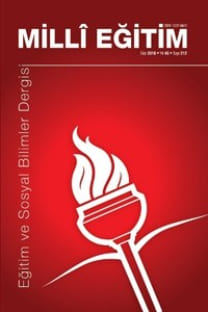COVID-19 VE EĞİTİM
Covid-19 Salgını, Eğitim, Öğrenci, Üniversite Öğrencileri, Öğretmen, Uzaktan ve Çevrimiçi Eğitim
COVID-19 AND EDUCATION
Covid-19 Pandemic, Education, Student, University Students, Teacher, Distance and Online Education,
___
- ACAR, Kürşat, MOR, Ahmet, BAYNAZ, Kadir ve ARSLANOĞLU, Erkal (2020). “An Investigation on Anxiety States of Students in Faculty of Sport Sciences During COVID-19”, International Journal of Disabilities Sports and Health Sciences, 3(1), ss. 66-73.
- AKYOL, Ceyhun (2020). “Turizm Eğitimi Alan Öğrencilerin Covıd-19 Salgınına Yönelik Görüşleri”, Journal of Gastronomy Hospitality and Travel, 3(1), 112-121.
- ALTUN EKİZ, Meryem (2020). “Beden Eğitimi Ve Spor Yüksekokulu Öğrencilerinin Karantina Dönemindeki Uzaktan Eğitim İle İlgili Görüşleri (Nitel Bir Araştırma)”, Spor ve Rekreasyon Araştırmaları Dergisi, 2(Özel Sayı 1), ss. 1-13.
- BASILAIA, Giorgi ve KVAVADZE, David (2020). “Transition to online education in schools during a SARS-CoV-2 coronavirus (COVID-19) pandemic in Georgia”, Pedagogical Research, 5(4), ss. 1-9.
- BURGESS, Simon ve SIEVERTSEN, Hans Henrik (2020). “Schools, skills, and learning: The impact of COVID-19 on education” VoxEu. org, 1.
- CAO, Wenjun., FANG, Ziwei., HOU, Guoqiang, HAN, Mei, XU, Xingrong., DONG, Jiaxin ve ZHENG, Jianzhong (2020). “The psychological impact of the COVID-19 epidemic on college students in China”, Psychiatry Research, 112934.ss. 1- 5 ÇİÇEK, İlhan, TANHAN, Ahmet., ARSLAN, Gökmen ve BULUS, Metin (2020). (İnceleme altında/manuscript under review). “Psychological Inflexibility Predictis Depression And Anxiety During COVID-19: Acceptance And Commitment Therapy Perspective”.
- DANİEL, Sir John (2020). “Education and the COVID-19 pandemic”, Prospects, ss. 1-6.
- GÖRGÜLÜ ARI, Aslı ve HAYIR KANAT, Meryem (2020). “Covid-19 (Koronavirüs) Üzerine Öğretmen Adaylarının Görüşleri”, Yüzüncü Yıl Üniversitesi Sosyal Bilimler Enstitüsü Dergisi, (Salgın Hastalıklar Özel Sayısı), ss. 459-492.
- https://en.unesco.org/themes/education-emergencies/coronavirus-school-closures. ,”UNESCO (2020). United Nations Educational, Scientific and Cultural Organization. COVID-19 educational disruption and response.” 27 Ağustos 2020.
- https://www.who.int/dg/speeches/detail/who-director-general-s-opening- remarks-at- the-mission-briefing-on-covid-19, “WHO (2020). “WHO Director-General's opening remarks at the Mission briefing on COVID-19”., 2 Ağustos 2020.
- KAHRAMAN, Mehmet Emin (2020). “COVID-19 Salgınının Uygulamalı Derslere Etkisi ve Bu Derslerin Uzaktan Eğitimle Yürütülmesi: Temel Tasarım Dersi Örneği”, Medeniyet Sanat Dergisi, 6(1), ss. 44-56.
- KARA, Yunus (2020).“Pandemi Sürecindeki Öğrenci Deneyimleri: Bakırköy İlçesi Örneği”, Avrasya Sosyal ve Ekonomi Araştırmaları Dergisi, 7(7), ss. 165- 176.
- KESKİN, Merve ve ÖZER KAYA, Derya.(2020). “COVID-19 Sürecinde Öğrencilerin Web Tabanlı Uzaktan Eğitime Yönelik Geri Bildirimlerinin Değerlendirilmesi”, İzmir Katip Çelebi Üniversitesi Sağlık Bilimleri Fakültesi Dergisi, 5(2), ss. 59-67.
- KORKUT GENÇALP, Deniz (2020). “COVID-19 Salgını Döneminde İlk ve Acil Yardım Öğrencilerinin Beslenme Alışkanlıkları ve Fiziksel Aktivite Durumlarının Değerlendirilmesi”, Paramedik ve Acil Sağlık Hizmetleri Dergisi, 1(1), ss. 1-15.
- KURNAZ, Ersin., & SERÇEMELİ, Murat (2020). Covid-19 pandemi döneminde akademisyenlerin uzaktan eğitim ve uzaktan muhasebe eğitimine yönelik bakış açıları üzerine bir araştırması. Uluslararası Sosyal Bilimler Akademi Dergisi, (3), 262-288.
- MUHAMMED, Adnan ve KAİNAT, Anwar (2020). “Online Learning amid the COVID-19 Pandemic: Students' Perspectives”, Online Submission, 2(1), ss. 45-51.
- PINAR, Mehmet Ali ve DÖNEL AKGÜL, Güldem. (2020). “The Opinions of Secondary School Students About Giving Science Courses with Distance Education During the Covid-19 Pandemic”, Journal of Current Researches on Social Sciences, 10(2), ss. 461-486.
- RODGERS, Mark, SOWDEN, Angele, PETTİCREW, Mark, ARAİ, Lisa, ROBERTS, Helen, BRİTTEN, Nicky ve POPAY, Jennie (2009). “Testing methodological guidance on the conduct of narrative synthesis in systematic reviews: effectiveness of interventions to promote smoke alarm ownership and function”, Evaluation, 15(1), ss. 49-73.
- SERÇEMELİ, Murat ve KURNAZ, Ersin (2020). “Covid-19 Pandemi Döneminde Öğrencilerin Uzaktan Eğitim Ve Uzaktan Muhasebe Eğitimine Yönelik Bakış Açıları Üzerine Bir Araştırma”, Uluslararası Sosyal Bilimler Akademik Araştırmalar Dergisi, 4(1), ss. 40-53.
- SERİN, Emre ve CAN KOÇ, Mustafa (2020). “Examination of the eating behaviours and depression states of the university students who stay at home during the coronavirus pandemic in terms of different variables”, Progress in Nutrition, 22(1), ss. 33-43.
- SINTEMA, Edgar John (2020). “Effect of COVID-19 on the performance of grade 12 students: Implications for STEM education”, Eurasia Journal of Mathematics, Science and Technology Education, 16(7), em1851.
- ŞAHİNLER, Yunus, ULUKAN, Mahmut ve ULUKAN, Hasan (2020). “Covid-19 Sürecinde Fiziksel Aktivite Yapan Spor Bilimleri Fakültesi Öğrencilerinin Saldırganlık Düzeylerinin İncelenmesi”, Akdeniz Spor Bilimleri Dergisi, 3(1), ss. 171-184.
- TANHAN, Ahmet ve STRACK, Robert William (2020).”Online Photovoice To Explore And Advocate For Muslim Biopsychosocial Spiritual Wellbeing And Issues: Ecological Systems Theory And Ally Development”, Current Psychology,ss. 1-16. https://doi.org/10.1007/s12144-020-00692-6.
- TANHAN, Ahmet. (2020). “COVID-19 sürecinde online seslifoto (OSF) yöntemiyle biyopsikososyal manevi ve ekonomik meseleleri ve genel iyi oluş düzeyini ele almak: OSF’nin Türkçeye uyarlanması. [Utilizing online photovoice (OPV) methodology to address biopsychosocial spiritual economic issues and wellbeing during COVID-19: Adapting OPV to Turkish.]”, Turkish Studies, 15(4), https://dx.doi.org/10.7827/TurkishStudies.44451 .
- TANHAN, Ahmet., YAVUZ, Kasım Fatih, K, YOUNG, John Scot, NALBANT, Ahmet, ARSLAN, Gökmen., YILDIRIM, Murat, ULUSOY, Sevinç, GENÇ, Emel, UĞUR, Erol ve ÇİÇEK, İlhan (2020). “A Proposed Framework Based on Literature Review of Online Contextual Mental Health Services to Enhance Wellbeing and Address Psychopathology During COVID-19”, Electron J Gen Med. 17 (6), em254.
- ISSN: 1302-5600
- Yayın Aralığı: Yılda 4 Sayı
- Başlangıç: 1973
- Yayıncı: Milli Eğitim Bakanlığı
ÖZEL MÜZİK KURSLARININ PANDEMİ SÜRECİNDEKİ UZAKTAN EĞİTİM DURUMLARI
Yakup AKSOY, Onur GÜÇLÜ, Aynur Elhan NAYİR
Koronavirüs (Covid-19) Küresel Salgınının Üniversite Öğrencileri Üzerindeki Etkilerinin İncelenmesi
COVID-19 DÖNEMİNDE SANAL SINIFLARDA ÖĞRETMENLERİN KARŞILAŞTIKLARI SINIF YÖNETİMİ SORUNLARI
Abdurrahman MENGİ, Yusuf ALPDOĞAN
SALGIN DÖNEMİNDE GERÇEKLEŞTİRİLEN UZAKTAN EĞİTİM SÜRECİNİN DEĞERLENDİRİLMESİ
COVİD-19 PANDEMİSİ SÜRECİNİN ÖĞRETMEN ADAYLARININ MESLEKİ YETERLİKLERİ AÇISINDAN İNCELENMESİ
Ayberk BOSTAN SARIOĞLAN, Rukiye ALTAŞ, Rabia ŞEN
COVID-19 SÜRECİNDE OKUL MÜDÜRLERİNİN TEKNOLOJİK LİDERLİĞİ
COVID-19 SALGINI İLE ACİL VE ZORUNLU UZAKTAN EĞİTİME GEÇİŞ: GENEL BİR DEĞERLENDİRME
Özcan EKEN, Nilgün TOSUN, Derya TUZCU EKEN
GÖÇ MAĞDURU ÇOCUKLARIN COVİD-19 SALGINI SÜRECİNDEKİ ÖĞRENME DENEYİMLERİ
